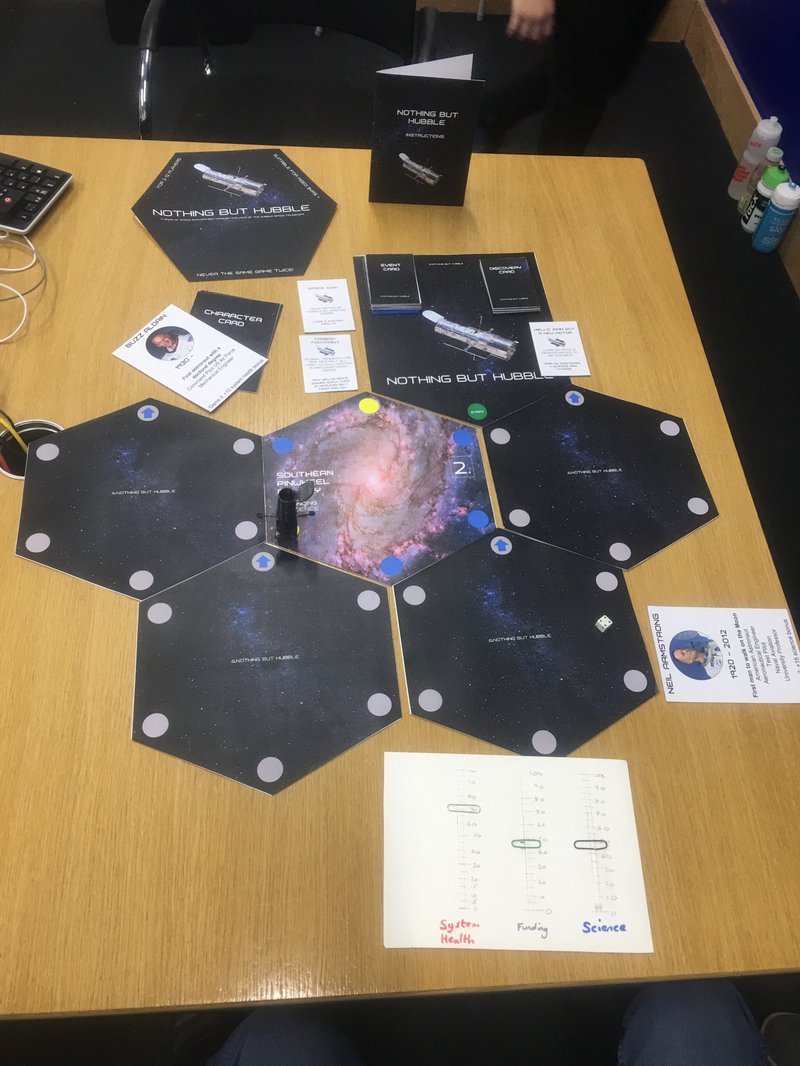Nothing but Hubble | On the Shoulders of Giants
Team Updates
The Rule book:
Rules
Aim ofthe game (when working collaboratively):
Make asmany discoveries as you can while keeping the telescope maintained.This requires that you balance your public funding, science andtelescope System Health (SH).
Aim ofthe game
Whenworking competitively:
Uncoverall the hex tiles of Hubble images or get 100 science.
Competitive:
Have the highest Science score once the last hex isrevealed or 100 Science.
Set up:
The numberof hex cards setout changes the time it takes to play the game. Wefound 8 hex cards takes about 20 minutes.
Shufflethe hexagons and deal out the amount of your choice. Place Hubblestart card down. The layout can be any continuous shape of yourchoice as long as at least one hex is next to the green dot on Hubblestart card. Place the hex cards face down in any order with at leastone straight edge of every next to another hex card straight edge.The arrows must all face the same direction towards the Hubble startcard.
Take outthe discovery cards and the event cards deck. Shuffle and place themon their spaces on the Hubble Start Card.
Place yourHubble counter on the Green start spot.
On thescore card set the resources sliders to 75 System Health, 50 fundingand 25 science respectively.
Shufflethe character cards. Each player draws a character card. Thecharacter cards have ability’s that can be used only once, but atany time in the game.
How toplay:
Playingcollaboratively, make a group decision of where to start. If you areplaying competitively, every player rolls the dice; the player withthe lowest number starts, and the player with the highest numberdecides which direction everyone starts off going (everyone starts inthe same place).
At thebeginning of each turn draw an event card, roll the dice, and movethe correct numbers of spaces in a direction of your choice. You canonly move to the adjacent dot and you cant move back to a dot youhave already been on until a subsequent turn. If you have entered anew hexagon, turn over the hex card and move to the correct dot. Keepthe arrow pointing in the same direction when the hex is turned over.
If youland on a discovery dot (a yellow dot) draw a discovery card and acton it. You can then decide whether to perform maintenance or not. Tokeep system health at current level pay 5 funds. To increase systemhealth by 5 pay 10 funds. You can increase system health by 10 bypaying 10 funds and 10 science.
If SystemHealth or Funds goes to 0 you get one more turn. If that resource isstill at 0 you lose the game.
Ifyou run out of science you can you lose 5 funds per turn that scienceremains at zero. Ie the public don't want to fund you if you aren'tdiscovering anything
You canplay your character card at anytime once to increase the resourceslisted on there.
In thecollaborative game your team wins if you get 100 science or all thehexes are revealed.
In thecompetitive game the person with the most science when the last hexis turned over wins
Customrules:
Makethe game more fun by reading out the description of each hex when itis first revealed.
SpaceExtra
If you runout of funds you can privatize your project. That returns funds to50, but halves your science score. Your science increase at half therate.
Copyright Nothing butHubble 2018








SpaceApps is a NASA incubator innovation program.